- Home
- Will Hobbs
Leaving Protection Page 8
Leaving Protection Read online
Page 8
“It’s getting late, hard to see,” I said. “Let’s split up, we’ll find it faster.”
Torsen’s eyes narrowed. He looked me up and down. “We’ll stick together,” he said, gesturing with the barrel of his gun. “I don’t want you getting lost in the woods.” He laughed.
After tromping all around, we finally found the survival suit, well back in the trees. It had been torn to shreds. This time the bear tracks were unmistakable.
I had to swim out to the skiff without a survival suit. It took only a couple minutes, but I was shivering cold as I hauled myself aboard. “Just untie from the buoy if the anchor is too heavy,” Tor called.
“I think I can pull it up,” I said, stalling for time. I was thinking about trying to ditch him. Just leave him on the island.
Maybe not, I decided as I heaved up the anchor. He had the rifle. He’d have me dead to rights.
“What’s the matter with you?” Tor said when I bumped the shore, and he stepped into the skiff with the rifle and the glass float. “Seen a sea monster? You don’t look so good.”
“I’m cold,” I said, which was partly true.
13
THE WIND QUIT THAT NIGHT. I was so used to the rocking of the boat, the stillness startled me awake. At first I had no idea where I was, and then I remembered. I was aboard the Storm Petrel, and I wanted off.
It was twenty after three by my watch. I had too much to worry about, and couldn’t get back to sleep. Forty-five minutes later, the captain’s mental alarm clock woke him up. As he was pulling anchor, I was already making the coffee. Tor had turned the VHF up loud, and it was blaring the weather forecasts from Yakutat clear down to Dixon Entrance.
“Let’s pull the stabilizers,” Torsen called from the wheelhouse door. “We’ll go faster with them out of the water.”
I thought I knew what this meant: in a few minutes I’d be homeward bound. “Heading south?”
“Not on your life. Look, it’s flat as a griddle out there. Winds light to variable on the Fairweather Grounds for the foreseeable future, that’s what they’re saying. I thought you wanted to catch fish until your arms fall off.”
“Won’t it take a long time to get there?”
“It’s another day north.”
“What if Fisheries closes the season right after we get to the Fairweather Grounds?”
“What if they don’t? This is a fishing boat, or haven’t you noticed? It’s always a gamble. Last year, king season stayed open sixteen, seventeen days. My guess is, we get in at least three days fishing up there. Three days is a lifetime if they’re biting.”
“Do we have enough gas?”
He looked at me as if to ask what business that was of mine, then said, “We’ll take a different route back. We can gas and sell at Pelican.”
Tor bent to pull the starboard stabilizer. I did the same on my side. As it cleared the water, I cranked hard on the rope to bring it above the bulwark. The stabilizer is a sort of flying wedge suspended by a rope from the middle of the trolling pole, one on each side of the boat. They ride two fathoms under the surface and reduce the side-to-side rocking of the boat. They also steady the action of the lures trailing behind. You don’t want to drop one on your foot; there’s a sawed-off cannonball welded to the underside.
As I grappled with mine and lowered it to the deck, I heard Tor cry out. His stabilizer hit the deck with a thud and his hand went to his lower back. His face was contorted with pain. “Now I’ve done it,” he roared. “Now I’ve done it.”
“I should have gotten both of them,” I said lamely.
“Too late now,” he said through clenched teeth as he staggered into the wheelhouse.
I followed, hoping this meant we couldn’t go farther north after all.
Tor sat on the edge of his bunk, grimacing when he wasn’t cursing under his breath. He had me get some pills from his things, a bottle of prescription painkillers that his daughter, Grace, had sent with him just in case. He took two.
The engine was running; we were adrift. “What now?” I ventured.
“Grab your coffee and slide in behind the wheel. Put it in gear and throttle up. Let’s get out of here.”
“Head south?”
“North! We already settled that. You signed up for king season, not a part of it. I thought you wanted to make some money!”
“I did, but your back—”
“There’s no buts when you’ve got a weather forecast like this. My whole life, I never lost a day’s fishing to aches and pains. Listen carefully: I want you to steer dead center out of this bay before heading north. Watch the Fathometer close, and use the GPS to follow the fifty-fathom contour around Cape Cross. Tell me when we’re in the clear.”
I did what I was told.
“Okay,” I said fifteen minutes later. “The cape is due starboard.”
“The next GPS cassette is in the drawer. It’s got the Fairweather Grounds on it.”
“Okay, got it. There, it’s on the screen. No more islands north of us, just the mainland coast.”
“That’s right, the St. Elias Mountains.”
“I can see ’em out the window, in the distance.”
“A white wall, right?”
“I’ve never seen anything like it in my life.”
“Three miles high and practically straight up. Keep scanning north on the GPS until you get to Cape Spencer and Lituya Bay.”
“Got those.”
“Look forty miles offshore. You’ll find the Fairweather Grounds.”
“Forty miles offshore? I thought the Fairweather Grounds must be off of Cape Fairweather.”
“You thought wrong. They’re called the Fairweather Grounds because on a clear day like today, you can see Mount Fairweather from there. Just like Captain Cook did when he named the sucker. Foulweather would have been more accurate. I’ve seen the peak only three, maybe four times.”
“Okay, I’ve located the Fairweather Grounds. From the contours, it looks like an underwater mountain range.”
“That’s exactly what it is. There’s the west bank and the east bank, with a wide gully in between. At one point you’re only seventy-eight fathoms above a peak. Swarms of salmon feed—herring and needlefish—hang out in the nooks and crannies. No end of kings there if you hit it just right, like we aim to. Punch in the coordinates for the southern end of the grounds. Then punch us a course from here to there, direct. No need to hug the coast on a day like this.”
“Did it,” I reported a couple minutes later. “We’re on autopilot, navigating by satellite.”
It gave me a queasy feeling to be putting the land at my back. If I had reason to be afraid of Torsen, I was doing exactly the wrong thing. Too late now. “I’ll make some breakfast,” I announced.
“Watch out some freighter doesn’t run us down.”
“Are you feeling better?”
“I’ll get up for breakfast.”
“Coffee, now?”
“What, drink it on my back? How fast you got us going?”
“Nine knots.”
“Leave it at that.”
I fried some bacon and made French toast with the last of our bread. Tor sat at the edge of his bunk as I set out the food, along with orange juice and coffee. He got up very carefully, but even so he was staggered by another bolt to his lower back. After steadying himself, he gritted his teeth, cursed, and settled into the aft side of the table where he could look over the bow.
Tor kept looking past me as he nibbled at a piece of bacon. His eyes were on the horizon though there was nothing to be seen. His face was unreadable as ever, like time-weathered stone.
The minutes went by like slowly dripping water. I couldn’t take the silence. “So where do you run to for the night,” I asked, “when you’re fishing the Fairweather Grounds?”
“You don’t,” he said impatiently. “You drift.”
“Just drift?”
“Just drift. Sometimes you end up miles from where you started.”
“What if some big ship comes through when you’re sleeping?”
“You hope they see your light.”
“Sounds a little sketchy.”
“It is, but it’s worth it. It’s big-time fishing.”
“What happens if the weather turns on you? Where’s your protection?”
“If the weather’s not too rough, you can ride it out on the lee side of Cape Fairweather. If it’s bad, you head into Lituya Bay.”
“I think I’ve heard of Lituya Bay.”
He looked like he was going to say something. “You may have,” was all he said. He got up, stiff as a robot. Having left most of what was on his plate, in seconds he was flat on his back again.
Midmorning, and there still wasn’t a cloud in the sky—freakish weather for Southeast. The flatness of the sea amplified the vastness. Unlike the sea bird it was named after, the Storm Petrel couldn’t take to the air if things turned ugly. It was going to be exciting to fish the open ocean, like a big-time Alaska commercial fisherman. Maybe too exciting. I’d heard plenty of stories, and I’d seen videos of storms in the Gulf of Alaska. At forty-five feet, the Storm Petrel was a big boat compared to my family’s Chimes of Freedom, but it was still classified as a small craft when it came to weather advisories.
Well, here I was, way, way outside and more scared than I’d expected to be. My biggest consolation, ironically, was my skipper. Tor had lived to be a graybeard, which meant my chances of getting home in one piece were good to excellent.
Unless he didn’t want me to.
Tor got up for lunch, and this time he stayed up. He suddenly remembered to double-check the course I had charted. I was relieved to find we were on target for the Fairweather Grounds, and not China.
Torsen read a gloomy article about the future of wild salmon in his Alaska fishing journal, the Pilothouse Guide. I looked through his bookshelf for something on Lituya Bay, with a strong suspicion that it was known for something. I couldn’t seem to remember.
At last I found some photographs of the bay along with a note about what it was famous for: an earthquake late in the evening of July 9, 1958. The quake’s epicenter was in the mountains at the head of the narrow bay.
I could barely believe what I was reading. The mountain to the edge of the glacier at the head of the bay sloughed so much rock, so fast, that the splash reached 1,720 feet up the opposite ridge across the narrow arm of the back bay. In one fell swoop, the wave scoured every tree and every bit of soil off that slope, from sea level to seventeen hundred feet up. The photographs proved the unimaginable. Before, all trees. After, nothing but bedrock.
“Look at this,” I said.
“Yeah,” Tor replied. “Lituya Bay. Did you read about the trollers?”
“There’s nothing here about trollers. Were there some in the bay when it happened?”
“Three trollers had anchored for the night, two just inside the spit at the entrance of the bay and one a mile or so inside, on the south side. A giant swell from the big splash raced down the bay at a hundred miles an hour, something like that. The people in the boats, they’d heard the big landslide and could see the swell coming. The boat farthest inside the bay rode way up on it and washed back safely. The other two, at full throttle, tried to ride the wave out of the bay.”
“You’re kidding.”
“You look a little green around the gills. You should. Be scared, kid: you have no idea what the ocean can do. When the swell hit the spit of land that pinches the mouth of Lituya down to a small opening onto the Pacific, that’s where it rose the highest, and that’s where it crested and broke. Both of the trollers that took the ride were destroyed.”
“Any survivors?”
“One crew was lost, one survived—a married couple. They told of looking down from the crest of the wave onto the tops of trees eighty feet below. When their troller was swamped outside the spit, they managed to climb into their skiff.”
“Unbelievable.”
“Believe it.”
“Wait a minute, Tor. It says here that on average, an earthquake wave in Lituya Bay occurs every twenty-two years. It says a wave drowned a party of Tlingits once, in their war canoes. Didn’t you say that Lituya Bay was our safe harbor? With a wave more than twenty years overdue?”
The old pirate grinned through his pain. “Feeling lucky?”
14
SALMON TROLLERS DOTTED the northern horizon. We had reached the west bank of the Fairweather Grounds. To the east, one mountain peak stood higher than all the rest along the great white wall. “When you can see Mount Fairweather,” Tor said, “you’ve got a couple days of fair weather fishing ahead of you.”
“If we can’t see it, we don’t stay here?”
“I didn’t say that. You fish it anyway, you just don’t sleep as easy. You listen to the forecasts, and you watch the birds, the clouds, and your barometer, in case you have to make a run for it.”
At last we closed with the boats ahead. Tor throttled down and we dropped in behind a troller heading north. Two men were leaning over the stern, gaffing salmon. I said, “You see what I see?”
“Drop the gear,” Torsen answered. “We got three hours of daylight. Make it count.”
I swung into the cockpit and let the gear down, port side first. Torsen stood above, hanging on to the hayrack and watching my every move.
Let him watch. The bite was on, and I was ready to do some serious fishing. I had worse things to fear from him than making a mistake running his gear.
I didn’t have to wait long. The tip line was jerking before I even put the heavy down.
“Never had trouble with sea lions out here,” Tor said. “Run all four lines down before you start to pull any back up. I’ll steer from up front. You’re going to have to do all the fishing.”
“I can handle it,” I said as I began to bring the first line up. There was a king on the second leader, and underneath it, another on the third.
Until it was getting too dark to see, nearly four hours later, I ran the gurdies, clubbed and gaffed and landed and cleaned salmon. It was unbelievable, and they never quit coming. Afterward, by the electric lights in the fish hold, I iced them until there wasn’t another left to be taken care of. At last I climbed out of the hold, shucked my gory bibs and boots, and staggered into the wheelhouse.
Torsen was snoring. My watch said ten minutes after eleven. I flicked the switch above the galley sink and looked at myself in the mirror. My face was speckled with dried fish blood. There were fish scales on the tip of my nose; a piece of gut was stuck to the side of my chin. I was sunburned and my hair was matted with slime.
Torsen’s dirty dishes were in the sink. The man hadn’t forgotten whose job that was, I thought bitterly. He could have left me something to eat.
I stared dully at my forearms. Washing the dishes would rid me of the scales glued to my skin. They were thick as sea lice around the vent of a salmon.
I needed to refuel my body first, then do the dishes, but was about to give up on all of it. Then I spotted a pan covered with aluminum foil at the side of the stove—baked salmon and a baked potato. I wolfed it down, desperate to get some sleep. On my way below, I hit the switch to turn off the wheelhouse lights. At the last second I remembered the fish-hold lights. Tor would definitely kill me, I thought with a grim laugh, if he woke to a dead battery.
In less than an hour it would be day thirteen. My parents and my sister would have gone out on two or three short trips during this time. Back home we never fished more than three days in a row. I could picture my family clean and showered and sleeping at home.
I went down the ladder and collapsed in my bunk.
Man, I needed a hot shower. My clothes stank, I stank, the boat stank. Drifting in the dark forty-eight miles from shore, it was insane. But working four lines the way I had done, doing all that work all by myself, what a rush that had been. Day thirteen, bring it on. I’ll do the same, slaughter them from dawn to dark. I was making money now, re
al money.
It was the sound of the squawk box, turned all the way up, that woke me. Why not the anchor chain, I wondered for a second, then remembered we weren’t anchored. It was 4:00 A.M.
I pulled on my clothes and staggered up the ladder, afraid that the weather was changing. “What’s the barometer doing?” I asked first thing.
“Check for yourself.”
I did. “It’s staying up. More good weather, like you said. Can you see Fairweather?”
“Don’t know yet.”
“Not enough daylight, eh?” My laugh sounded forced, because it was.
“Make yourself a cup of coffee to take back to the cockpit with you. Grab a box of cookies.”
“You’re kidding. It’s too dark to fish.”
“Do the dishes first, then. I never kid about fishing.”
“I forgot all about the dishes. It was late.”
“Hurry up. In a few minutes, it’ll be light enough to see the gear.”
“How far did we drift? Aren’t we off the grounds?”
“We drifted eight miles. We’re over the western edge of the east bank.”
I stumbled out onto the deck and relieved myself over the side. I could see mast lights from close to twenty trollers, but nobody was fishing yet.
Washing my hands and my face at the galley sink, I felt semihuman again. After nearly two weeks with little sleep, I was punch-drunk, like a brain-injured boxer. I did the dishes, then made myself a mug of coffee, double strong.
Torsen seemed to be sizing me up, like a trainer from the corner of the ring. He was wondering if I was going to make it through round thirteen.
“Lemme at ’em,” I said. “How’s your back?”
“Still locked up. Pills don’t even touch it. Barely slept.” Torsen hit the starter button and the Storm Petrel’s engine rumbled to life. As it warmed up, I went through my mug of coffee and five cookies, then fixed another mug.
“Ready when you are,” Tor said.

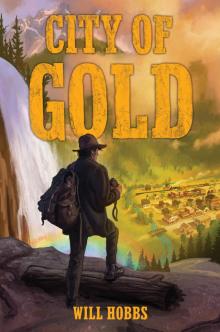 City of Gold
City of Gold Kokopelli's Flute
Kokopelli's Flute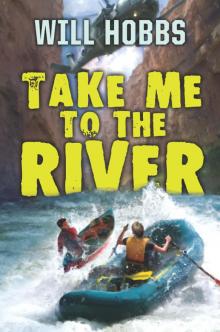 Take Me to the River
Take Me to the River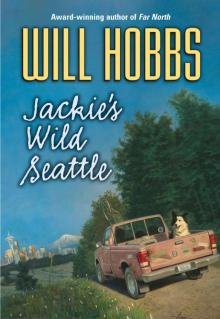 Jackie's Wild Seattle
Jackie's Wild Seattle The Maze
The Maze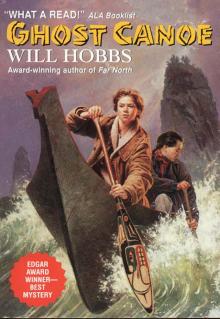 Ghost Canoe
Ghost Canoe Never Say Die
Never Say Die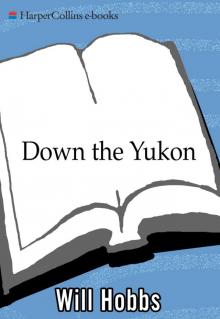 Down the Yukon
Down the Yukon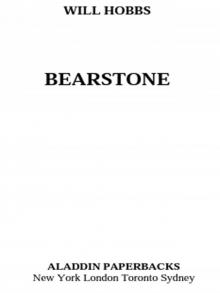 Bearstone
Bearstone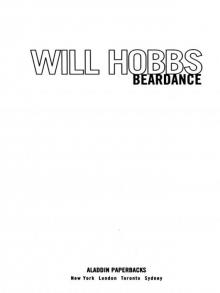 Beardance
Beardance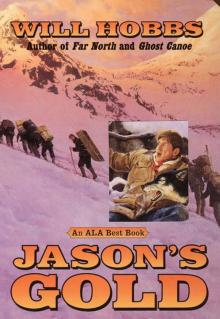 Jason's Gold
Jason's Gold Far North
Far North The Big Wander
The Big Wander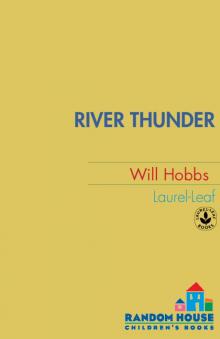 River Thunder
River Thunder Downriver
Downriver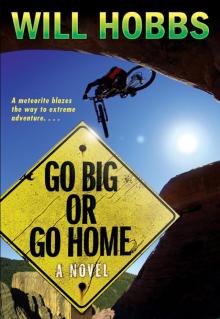 Go Big or Go Home
Go Big or Go Home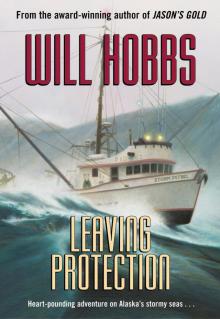 Leaving Protection
Leaving Protection Wild Man Island
Wild Man Island